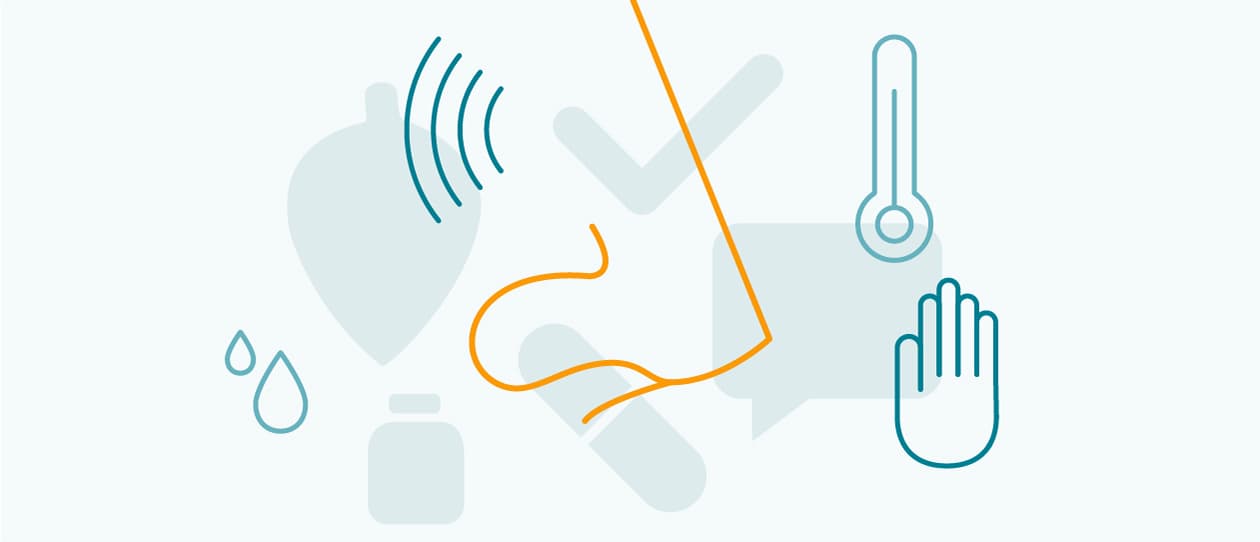
- Health hub/
- Tips & Advice on Cold, Flu & Boosting Immunity/
- Allergies - Symptoms and Causes


When someone has an allergy, it means their immune system overreacts to something – called an allergen – that doesn’t cause a problem for most other people.
This overreaction leads to inflammation that triggers a range of allergic conditions, which affect different parts of the body. For example, allergic conditions like eczema and hives affect the skin, asthma affects the lungs and hay fever affects the nose and eyes. The most severe allergic condition is called anaphylaxis, which can affect the whole body.
Around 20 per cent of Australians have some type of allergy, with common allergens found in dust mites, pets, pollen, insects, moulds, foods.
Symptoms
Allergies can result in a wide range of symptoms depending on the allergy and how the allergic person’s immune system reacts. Common allergy symptoms include:
- Digestive upset
- Swelling of the lips, face or eyes
- Swelling of the tongue or throat
- A skin rash
- Sneezing and a runny nose
- Itchy, red and watery eyes
- A wheeze or persistent cough
Common allergens
There are many different allergens, but the most common ones are:
- Food.The most common triggers of food allergy are egg, cow’s milk (dairy), peanut, tree nuts, sesame, soy, wheat, fish, and other seafood. Allergic reactions to food range from mild to moderate, including swelling of the face, hives or stomach pain, to severe, affecting breathing.
- Plants.This is often pollen from grasses and plants, which causes hay fever symptoms like a runny, itchy nose and itchy, watery eyes. Plants can also trigger allergic contact dermatitis in some people.
- Insects. Dust mites, as well as the venom from bees, ticks, ants and wasps, can trigger reactions. Most allergic reactions to insect bites and stings are mild to moderate, although allergies to stinging insect venoms are the most common cause of severe allergic reactions in Australia. Dust mites can trigger asthma, eczema and chronic sinusitis.
- Moulds. Indoor and outdoor areas that are damp and have mould can trigger symptoms of asthma in some people.
- Pets. This is typically caused by dog saliva, the sebaceous glands in a cat’s skin and the dander that both animals can shed. Common reactions are hay fever and asthma.
- Chemicals.These can include industrial and household chemicals, and the products that contain them such as latex gloves, cosmetics and detergents. Contact dermatitis can occur.
The most common forms of contact with allergens are:
- Dietary – eating a food which you’re allergic to.
- Inhaled – when the allergen is present in the air you breathe, such as pollen.
- Contact– when your skin physically comes into contact with an allergen, like latex.
Why do some people have allergies and others don't?
The answer to this isn’t completely understood, but it’s thought that the immune system’s tendency to overreact to a substance that other people find harmless is likely to have a genetic component.
Diagnosis
Allergy tests, including blood tests and skin prick tests, can be used to help identify or confirm which allergens are causing an allergic reaction. They can be particularly useful for people who have asthma or hay fever, or where the suspected allergen is an insect, food or drug.
For food allergies, elimination diets and food allergen challenges can also be used to confirm or exclude a food allergy, but these should only be undertaken under medical supervision.If your hay fever or sinusitis occurs at the same time of year, every year, it’s likely that you’re allergic to pollen or other plant matter that is present in the air during that season.
Prevention and treatment
Once the cause of an allergy has been identified, avoiding or simply minimising exposure to the allergen can help to reduce symptoms. Over-the-counter and prescription treatments may help manage or reduce allergy symptoms. It is best to consult a health professional to determine what is best for your health concerns.
Important notes
If you have any concerns with your health or think you have an allergy, speak to your health professional who may refer you to a dietitian, a dermatologist or a clinical immunology/allergy specialist.




